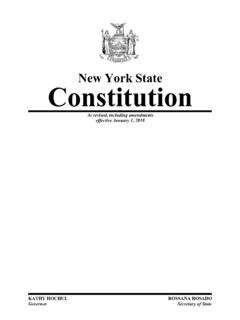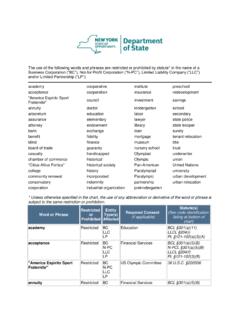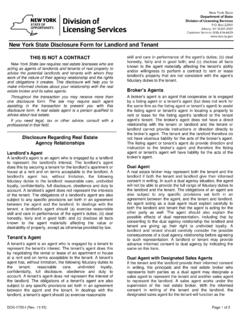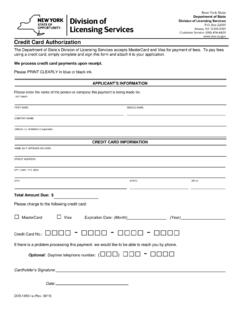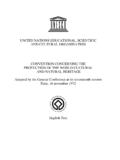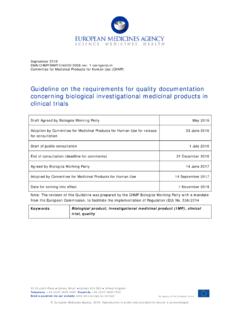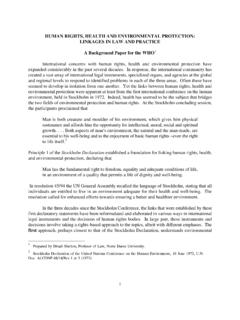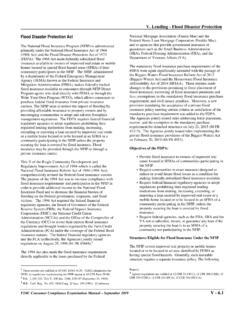Transcription of Guidance for Real Estate Professionals Concerning the ...
1 Revised 5/25/2021 INTRODUCTION TO THE NEW LAWS On June 14, 2019, Governor Andrew Cuomo signed into law the Statewide Housing Security & tenant protection Act of 2019 and the Housing Stability & tenant protection Act of 2019 (the Acts). The Acts are a sweeping and comprehensive collection of new provisions that strengthen tenant protections for all New Yorkers. To help licensed real Estate brokers, salespeople, and other interested parties understand the new law, the New York State Department of State (the Department) has prepared this Guidance . Please visit our website at periodically for important updates. The information offered below should not be used in lieu of seeking appropriate legal advice and is not intended to answer general questions by private landlords, cooperative boards, or condominium boards regarding the Acts.
2 This Guidance is subject to change and licensed Professionals should frequently visit this page for important updates based on future interpretations of the Acts by the courts. WHAT DO THE ACTS PROTECT? The Acts broadly protects applicants seeking housing and tenants throughout the state. For specific information Concerning rent regulated rentals and how the Acts applies to those units please visit Homes and Community Renewal (HCR). DO THE ACTS RESTRICT APPLICATION FEES FOR RENTALS? Yes, under the Acts a landlord, lessor, sub-lessor or grantor is now prohibited from collecting an application fee greater than $ unless otherwise provided for by law or regulation.
3 NY Real Property Law 238-a(1)(b). Further, if the potential tenant provides a copy of a background check or credit check conducted within the past thirty days the fee must be waived. NY Real Property Law 238-a(1)(b). The $ limitation applies to licensed real Estate brokers and salespeople acting as an agent of the landlord, lessor, sub-lessor or grantor . A licensed agent that collects a fee greater than $ or fails to advise the landlord that such fees are prohibited may be subject to discipline by the Department pursuant to Section 441-c of the New York Real Property Law. Additionally, if a prohibited fee is collected and the property is subject to rent regulation, the tenant may also seek appropriate relief through HCR.
4 The rule does Guidance for Real Estate Professionals Concerning the Statewide Housing Security & tenant protection Act of 2019 and the Housing Stability and tenant protection Act of 2019 Revised 5/25/2021 not apply to licensed agents when the age nt has been formally engaged to represent the interests of the prospective tenant or when the agent is brokering the sal e of a property, including within a cooperative or condominium. In the absence of a decision from a court or other body with jurisdiction to determine such matters, the Department is not taking a position about the legality, under NY Rea l Property Law 238-a, of an agent s collection of f ees greater than $ on behalf of a cooperative orcondominium board when the board is not the owner of the rental a partment/unit ( , the boardrequires a separate application fee fro m all rental applicants in addition to the $ feecollected by the owner/landlord).
5 Accordingly, the Department, until further notice, will notsubject a licensed agent to discipline if s uch agent collects a fee greater than $ on behalf of a cooperative or condominium board when the board is not the owner of the rental a partment/unit. However, the Department cautions agents that the collection of such fees may nonetheless violateother laws, such as t he prohibition against s ource of income seeking to file a complaint with the Department against a licensed real Estate broker or salesperson may download a complaint form: Anyone seeking to file a complaint with HCR Concerning a rent regulated apartment may download an overcharge complaint form from the Office of Rent Administration DO THE ACTS RESTRICT USE OF PRIOR DISPUTES?
6 Yes, under the Acts, no landlord shall refuse to rent or offer a lease to a potential tenant on the basis that the potential tenant was involved in a past or pending landlord- tenant action. NY Real Property Law restriction applies to licensed real Estate brokers and salespeople Acting as an agent of the landlord . DO THE ACTS RESTRICT LATE RENT FEES? Yes, under the Acts no landlord, lessor, sub-lessor or grantor may demand any payment, fee, or charge for the late payment of rent unless the payment of rent has not been made within five days of the date it was due, and such payment, fee, or charge shall not exceed fifty dollars or five percent of the monthly rent, whichever is less.
7 NY Real Property Law 238-a(2). This restriction applies to licensed real Estate brokers and salespeople Acting as an agent of the landlord, lessor, sub-lessor or grantor . WHEN DO SECURITY DEPOSITS HAVE TO BE RETURNED? Under the Acts, a landlord must [w]ithin fourteen days after the tenant has vacated the premises, .. provide the tenant with an itemized statement indicating the basis for the amount of the deposit retained, if any, and shall return any remaining portion of the deposit to the tenant . If a landlord fails to provide the tenant with the statement and deposit within fourteen days, the landlord shall forfeit any right to retain any portion of the deposit.
8 New York General Obligations Law 7-108(1-a)(e). An agent who is working for a landlord and is holding a security deposit is required to comply with this section. Revised 5/25/2021 ADDITIONAL FAQS (UPDATED: 5/25/2021) A LANDLORD S AGENT REQUEST ADVANCE RENT PAYMENTS OR SECURITYDEPOSITS GREATER THAN ONE S MONTH RENT?No, unless otherwise provided by applicable law, Section 7-108(1-a)(a) of the NY GOL states, in part, Nodeposit or advance shall exceed the amount of one month s rent under such contract. An agentrepresenting a landlord may not request advance rent payments or security deposits greater than one smonth rent regardless of the length of the proposed example, a landlord retains an agent to locate a tenant for a short-term rental ( , 3-6 months).
9 Under such situations, the agent must advise the landlord/prospective tenant that an agreement calling for upfront rent payments ( , the full-term rent) prior to the end of the tenancy or a security deposit larger than the pro-rata portion of one month is void. NY GOL 7-108(3). A broker that requests advance rent payments/ security deposits greater than one s month rent can be subject to discipline. However, the Department will not seek to impose discipline against a licensee, where for example, a prospective tenant receives a government subsidy and as part of that program an advance payment is paid. A LANDLORD S AGENT COLLECT AN ADDITIONAL SECURITY DEPOSIT FORPETS OR MOVE IN EXPENSES?
10 No, Section 7-108(1-a)(a) of the New York General Obligations Law (NY GOL) states, in part, Nodeposit or advance shall exceed the amount of one month s rent under such contract. A deposit isintended, in part, to reimburse a landlord s costs beyond normal wear and tear, non-payment of utilitycharges payable directly to the landlord under the terms of the lease or tenancy, and moving and storage ofthe tenant s belongings. The landlord may not retain any amount of the deposit for costs relating toordinary wear and tear of occupancy or damage caused by a prior tenant . NY GOL 7-108(1-a)(b). Abroker acting on behalf of a landlord and who collects an additional pet deposit or move in fee can besubject to discipline pursuant to Section 441-c of the New York Real Property Law (NY RPL).
